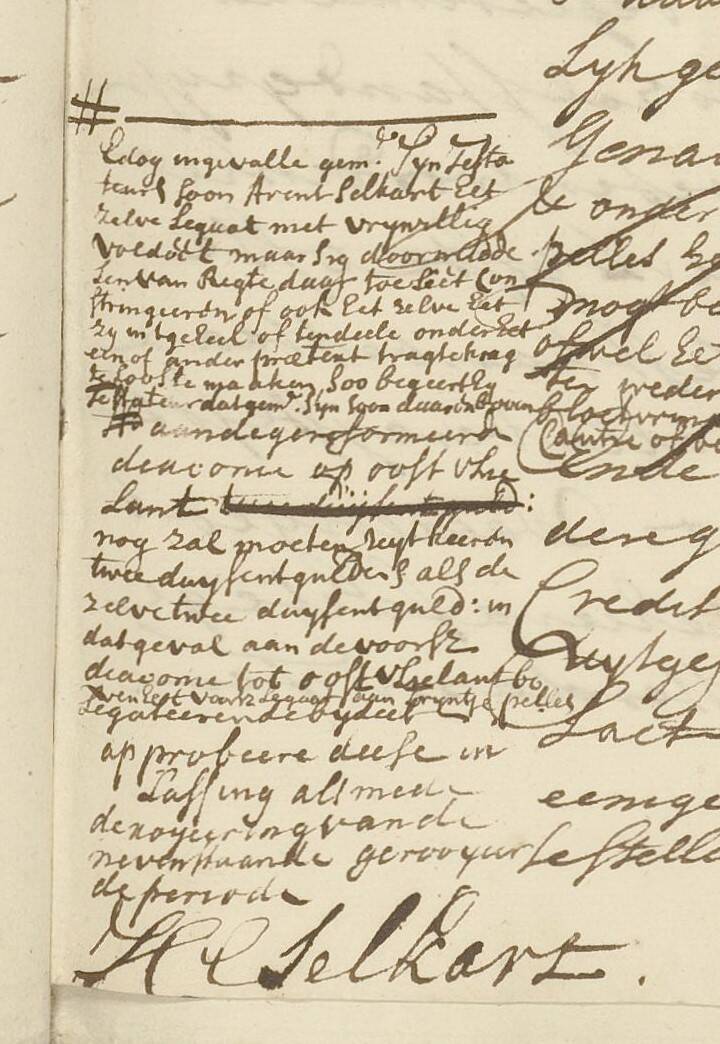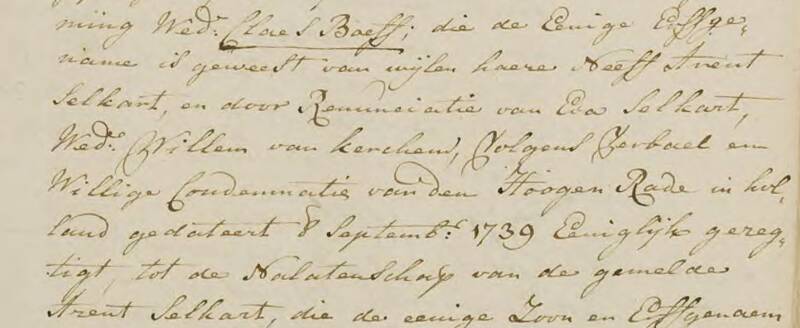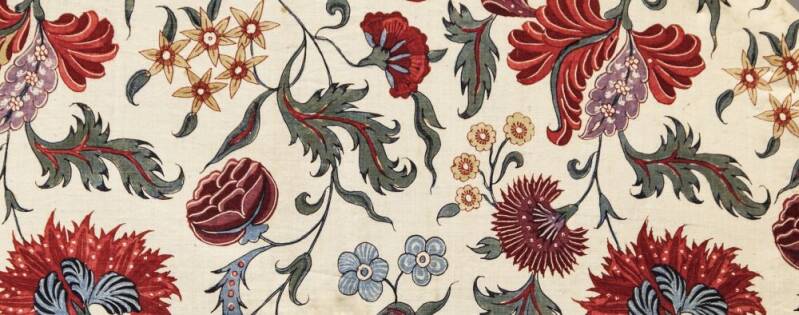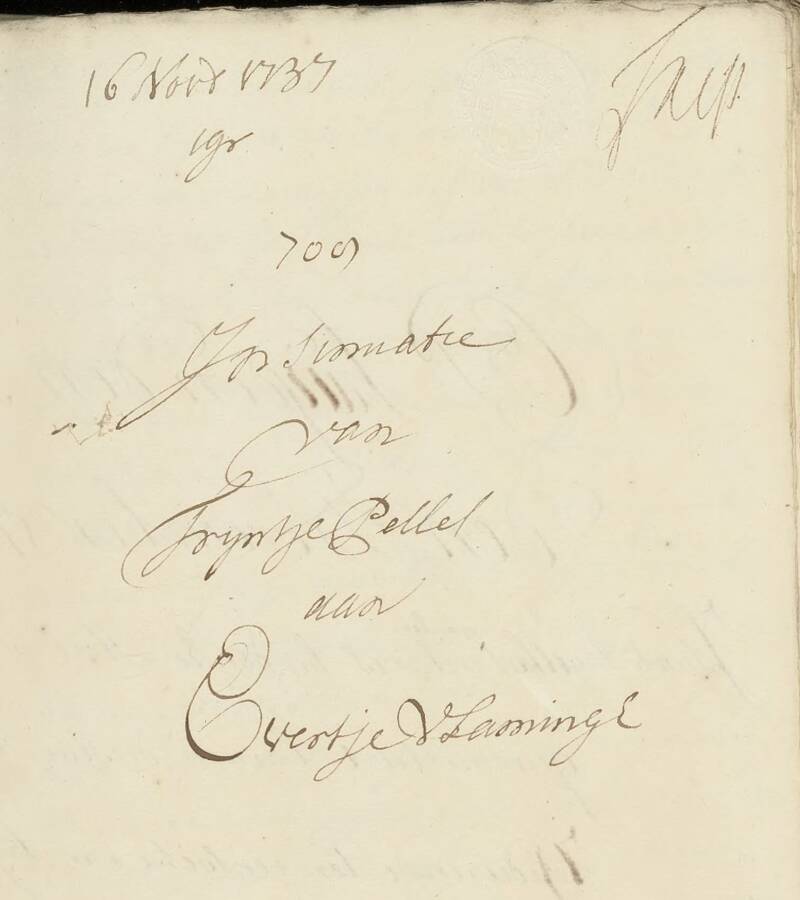AEFJE
About a beautiful brotherly love
Three of Willem and Willempie's children reached adulthood. It is useful to also trace their lives, because this occasionally gives us some information about Willem de Vlamingh.
Snow balls
A deed dated early January 1705 (1) shows Evertje and Aefje live together in a house in Amsterdam. It seems that Willem's eldest daughter, who had moved to the capital with her family a few years earlier, has now taken her youngest sister into her home. The offspring is then only seventeen years old. This situation suggests both their parents might be dead by then.
The girls live in a house on the Brouwersgracht close to the Brouwersstraat. Two other unmarried sisters also live there. The women are harassed by some overeager gentlemen who bang on the front door in the middle of the night. A dialogue ensues:
- Who's knocking there?
- Good people!
- It's late, we don't open the door this late.
- We must have Chitz.
Chitz was a type of printed fabric. Do the men want to buy pieces of cloth? This late at night? It sounds like a bad boy's prank. The girls apparently think so too, because they shout to the men standing at the door: Then you should come back tomorrow. It's too late now. However, the troublemakers are not so easily chased away. Once again there is a loud knock on the door of Evertje's house, and this time also on the windows.
The troublemakers utter many foul curses and shout, for example: Open the door, you animals, or you will be sorry. Not really nice people to open up to so late at night. Ultimately, the three attackers pelted the house with snowballs, shattering no fewer than eleven windows in the front of Evertje's house. Finally, the night watch has to be involved and Aefje has the entire incident recorded with the notary who is located near het Herenlogement (a Men's Lodge).

The Nieuwezijds Herenlogement (later West Indies House), Haarlemmerstraat 75 (around the year 1775), Manufacturer: H. P. Schouten (1747-1822), Amsterdam City Archives Collection
This was the same notary as the one Willem and Evertje visited in the summer of 1702 (in the case against Volckert Tor). Perhaps this story is about the same house Evertje lived in back then, because in the past you always just took the nearest notary and so she still lived in the same neighborhood as three years ago. In that case, we may perhaps conclude that Willem de Vlamingh lived on the Brouwersgracht for the last years of his life and most likely even breathed his last breath there...
Shop on Vlieland
A few years later, Aefje got married and returned to Vlieland, where she lived with her family. Her husband, Hendrick Casper Selkart, was quite a portrait (2). He came from a well-to-do Schiedam family, but refused a job at the Hoogheemraadschappen (the Water Board), because he had fallen in love with some innkeeper's daughter. His mother had the police lock him up in the improvement house for three months, but he escaped. Not long afterwards he married Aefje, eight years his junior, and got a job as a Criminal Investigation Officer on Vlieland. This meant, among other things, he had to secure the cargo of ships that had run aground (3). In the meantime, Aefje ran a small shop on the island. We have found an inventory showing that someone paid for shopping goods purchased by o aefje Vlaming (4).

The family got two sons. The boy they baptized in Amsterdam on March 4, 1708 bears two names: Casper Willem and will be addressed by both names throughout his life. It is very common among Catholics to have multiple baptismal names, but if you take a closer look at the rest of this baptismal book from the Northern Church in Amsterdam, you will see this did not happen very often among Protestants.
Their eldest son was therefore not only named after his father's father, who was called Casper, as is traditional with naming, but also after his mother's father Aefje. This first grandson of Willem de Vlamingh which we encounter on our journey through time is therefore very deliberately named after him!

Father: Hendrick Casper Selkart, mother: Aeltje Vlaming, child Casper Willem, witnesses: Cornelis and Evertje Vlaming
Two years later, the couple baptized their second son Arend on Vlieland (5). This name occurred regularly in the Selkart family.

April 20, 1710: Arend, son of Hendrik Casper Selkoert and Aafjen Vlamings. Witnesses: Willem van Kerkhem and Eva Tholingx
The boys received a good education, but sister Evertje had to help financially to make it possible. She payed the school fees for both sons of her youngest sister and later also a considerable amount for a number of years to let them have an Instruction in Arithmetic, Bookkeeping, etc. (6).

Source: Amsterdam City Archives
Brotherly love
When Casper Willem was almost 14 years old, he apprenticed with the Amsterdam notary Jeremias Oxford in the Spuistraat (7). His parents still lived on Vlieland, so it was quite a big step for such a young boy to go and live in the big city. Perhaps the child was staying with his aunt Evertje, who had lived in Amsterdam for many years already. At the age of twenty, Casper Willem signed on as a bookkeeper on a VOC ship (8). As a pen pusher, he clearly had the sailor's blood of his grandfather Willem running through his veins!

Casper as notary: National Archives in The Hague: 1.04.02, inventory number 5897, scan 243
One month before departure, Casper Willem had quickly draw up his will (9). Even though he may still be young, traveling to the Far East was a dangerous adventour and one could never know what would happen... He named his parents as his sole and complete heirs. If they die before he did, Casper Willem left everything to his brother Arend, with no exception whatsoever.
While his ship was en route to Ceylon, his mother Aefje died, only 41 years old. The drama that unfolded after her death clearly shows what a beautiful family Willem and Willempie had created.

The date of Aafje Willems' death on October 25, 1729 is recorded in the books on Vlieland. Membership register Reformed Municipality of Oost-Vlieland, archive number 28, Tresoar Collection, inventory number 746, deed number 1096
On October 25, 1729, Aefje died (10) and within five months the new widower Hendrick Selkart wanted to remarry. In itself, quick remarriage may have been common at that time, but Hendrick had his eye on his - probably at least thirty years younger - maid, Trijntje Pelles. The entire De Vlamingh family is in turmoil. Evertje and Cornelis, Aefje's brother and sister and probably the only two remaining family members at that time, put their heads together. Not only did they do everything they could to prevent this shameful and ruinous marriage, they were especially committed to the legacy of their nephews Casper and Arend. Hendrick refused to have a proper inventory drawn up of his wife's goods (11). If the estate is not first divided fairly, everything from their mother Aefje will automatically pass to the new woman through marriage and the boys will receive nothing.
In the following court case, a lot of information is revealed about the character of Aefje's husband. A fellow commissioner on Oost-Vlieland claims Hendrik Selkart drinks a lot and leads a completely dissolute life of swearing, cursing, lying and cheating, and he also wastes their good money on bad things (12).

His youngest son Arend had already fled the miserable home situation and is ultimately lovingly cared for in his aunt Evertje's house in Amsterdam. When Arend had his will drawn up in the same period (he was only twenty years old (13)), it immediately became clear what the relationships were.

He appoints his beloved brother Casper Willem - if he is still alive - as first and full heir, otherwise his possessions go to his aunt Evertje and uncle Cornelis (half each). His father only mentions the boy last and he does not grant him more than his legitimate portion (what Hendrick is entitled to as a father). Arend finds a new home with his godmother Evertje.
Casper Willem had long since died abroad, on January 22, 1730, but due to the great distance, this message only reached the family in the Netherlands a year and a half later. The skipper and the first mate of the ship Mijnden on which Casper had sailed almost three years earlier, personally went to notary Mathys van Son to report about the death of their accountant on board of their ship, just after arrival in Ceylon (14).
On his deathbed, Casper Willem told them several times he wanted all his belongings to be given to his brother Arend after his death. Both of their wills testified to their love for each other. The two brothers did not appoint their parents but each other as the main heir.
Arend Vlaming Selkart
Arend settles permanently in the capital. He registers as a citizen (15) and gets a job as an interest calculator at the loan bank (16). It is very striking that after the death of his mother he changed his name from Arend Selkart to Arend Vlaming Selkart. Apparently the semi-orphaned boy now identifies so strongly with his mother's side of the family he wants to express this connection by taking their surname.

Arend's registration as burgess of Amsterdam on December 1, 1733

The first act in which we encounter this phenomenon it originally just says Arend Selkart. It is touching to see how the name Vlaming was later written above and crammed between the lines. The surname of Aefje, Evertje and Willem de Vlamingh (but without the prefix “de” and without “H” at the end) also stands firm in his signature as a kind of proud middle name (17).

Amsterdam City Archives: 5075, inventory number 9755, number 19, scan 44



Front and back of Arend's letter to report his father's death to a family member
Source: Allard Pierson, University of Amsterdam, hs. T 107
Arend's father had recorded in a will (20) he not only left a house (21) to his fiancée Trijntje Pelles, but also 8,000 guilders - a true fortune at that time. Even though the lovers were not allowed to get married, the two were still together more than five years later, while they must be frowned upon in the small religious village because of their relationship.

Hendrik knew very well how his son felt about this commitment to Trijntje, because in a corner of his will he added at the last minute the maid would receive an extra 2,000 guilders if Arend did not keep to this legacy.
Arend however granted his father's will. A year later, it turns out he has already paid almost half of the money to Trijntje Pelles and they agreed he will pay out the remaining amount to her in six months' time with an interest of 2.5% (22). Evertje is the guarantor (while women in Amsterdam, according to a note from the notary, could not actually be guarantors, but she does it anyway). In retrospect, that's a good thing, because Arend dies before the six months are up and ultimately it is Evertje who had to pay out the rest to Trijntje.
So on November 16, she hands over twelve large bags of cash to the maid at the notary. A total of 4,250 guilders plus the interest of 53 guilders and two pennies. All coins divided over no fewer than twelve large bags. Apparently people walked the streets with that kind of fortune at the time. When she got home, Trijntje counted everything very precisely and guess what? A bag with a note containing five hundred guilders contained only four hundred!
That same afternoon, Evertje is summoned to the notary again. She defends herself by stating the notary had offered to count the money on the spot, but Trijntje had taken the bags with him unopened. Ultimately, Evertje is summoned to court (23) because of the last missing hundred guilders.
A gem
Evertje had to get very busy when her cousin Arend died. This gave us a wonderful find, namely a letter Willem de Vlamingh's daughter wrote inher own handwriting (in which she informed one Frans van Limborgh - who worked as a tax lawyer in The Hague - of the fact his cousin Arend was dead).

A letter personally written by the daughter of Willem de Vlamingh (Allard Pierson, University of Amsterdam, hs. T 160)
The letter states Arend Vlaming Selkart died on June 14, 1737, after a short illness of only nine days, at the age of 27. A week later, Arend's body was transferred by ship to Vlieland to be buried on the island. We know this because the family had to pay a 10 guilder fine for a so-called Buijtenlijck (an "outside corpse", so anyone who was not buried within Amsterdam).

Fines on burial, archive number 343, inventory number 577, scan number 64
There will be a lot of arguing about his inheritance afterwards. Arend had - as we have seen - left everything to his aunt Evertje, but an aunt on his father's side (Eva Selkart, Hendrick's sister) would contest the will. Several witnesses came to the notary (24) to make statements in favor of Evertje Vlaming. Including a colleague of Arend's at the loan bank, who remembered how Arend always talked about his Peetje (his lovely godmother). When he had nothing she offered him food, drinks, lodging, clothes, money and everything for his need. Without her he would probably have had to go to the East Indies as a soldier (as the only and not very attractive option to survive). The pet name Peetje (instead of "peetmoeder" which means godmother) with which he refers to Evertje says it all!
Now his aunt really spoiled him during the time he lived with her. She bought all kinds of luxury items for Arend, such as silk stockings, wigs, oysters, and he also received pocket money (25). Remarkably, she also faithfully paid for his seat in the islander church every year, even though he had long lived in Amsterdam. This seat in the church suggests Arend still visited Vlieland regularly. He also had a house there at Dorpsstraat number 57. In this way, Willem de Vlamingh's grandson was connected to his roots on Vlieland until his death.

January 1731: For the place of A. Selkert in the Island Church (Amsterdam City Archives on August 29, 1738, notary Jan Ardinois)
A big inheritance
Eva Selkart was probably attracted by the big inheritance that could be distributed from Arend's estate, no less than 28,000 guilders. Not to say Arend himself earned this much as a bank clerk. He had inherited this money from his uncle Cornelis de Vlamingh, who had died shortly before.
Arend had immediately bought all kinds of things from it when he inherited it, such as four shares in ships and half a factory (for making lamp oil from whale fat) in Oostzaan. He also quickly paid off some of his father's and his own debts (26). When all this is settled, the amount he leaves is only ten thousand guilders. Still a lot of money at that time and Eva Selkart wants to get some of it.
However, Evertje is within her rights and fights like a lioness for her nephew's inheritance. She opens the household book she kept all those years and lists the costs she has incurred over the years due to paid bills for Hendrik Casper Selkart and his wife and children. There follows a list of no less than fifteen pages with bills which Evertje has paid for her sister's family (27). For the doctor, hairdresser, tailor and farrier (for the horses of the carriage she also bought for them). Not only do we see vouchers issued every year for essential items such as firewood, meat, butter, shoes and gloves, but also for wine, coffee and tobacco. She even helped buy a house for them.
From the enormous amount of wine paid for, we seem to be able to conclude Hendrick Selkart had a serious drinking problem and also had years of outstanding debts that were ultimately reimbursed by Evertje. She says she has lost even more money to him, but she has to remain silent about that (she wants to be discrete about the worst issues). At his death, Arend's father still had at least 5,000 guilders in debts outstanding. Perhaps he had other addictions…

Widow Claes Boeff, who was the only heiress of her late cousin Arent Selkart, and through Renunciation of Eva Selkart (widow of Willem van Kerkhem), according to the verbal and willing condemnation of the Supreme Court in Holland dated September 8, 1739, is the only one entitled to the estate of the reported Arent Selkart
All in all, Evertje calculates she has spent more than 30,000 guilders on her sister's family in her lifetime (28) and this meager 10,000 guilders inheritance is only a small compensation for all the expenses incurred. Evertje was vindicated by the Court of Holland on September 8, 1739, on the basis of Arend's will (in which he left everything to her) (29). The other aunt got nothing.
Among all the goods Arend left to Evertje (30) there are also some personal items belonging to Casper when he was in Asia (including some cutlery, silver buttons and a tobacco box). Arend also owned several houses, both his own and his father's, in Amsterdam and on Vlieland (31). But the very first - and therefore most important - item mentioned in the inventory list of goods is the golden chain Arend inherited from his uncle Cornelis. On this chain hangs a medal which Cornelis earned when he sailed with the return fleet to the Netherlands as an admiral. This heirloom, of which the family is clearly proud, will now be in Evertje's possession.

Gouden ketting (golden chain)
Conclusion
From this description of the lives of Aefje and Arend we get the strong impression De Vlamingh's were a close-knit family in which the various members stood up for each other. After the death of their sister Aefje, Cornelis and Evertje worked hard to secure the inheritance of their nephews Casper and Arend; they supported Arend when his father wanted to marry again (with a young maid) and Evertje took her nephew under her wing after he was left an orphan. She gave him shelter and food and even money to have some fun. Afterwards he always spoke lovingly about his Peetje.
The deeds we found show their affection and care for each other. For example, Evertje ensured that her nephew was faithfully referred to as “Arent Vlaming Selkart” in the long inventory she had drawn up after his death, all 26 times his name appeared in the deed. Twice the name Selkart has even been demonstratively crossed out to replace it with the Vlaming Selkart. She consistently and consequently ensured that Arend carried her adopted surname even after his death. These old deeds may seem dull and dusty at first glance, but the love of the various family members for each other still speaks to us in all the little details, even all these centuries later.


The name Arent Selkart replaced with Arent Vlaming Selkart



Maak jouw eigen website met JouwWeb